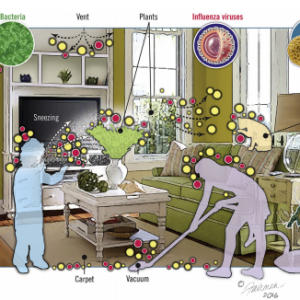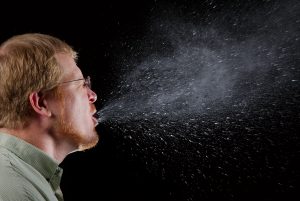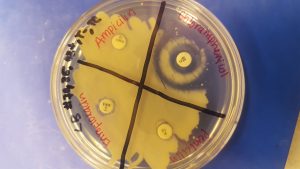By Amanda Makowiecki 1st Year Mechanical Engineering PhD Student Miller Research Group, University of Colorado Boulder Researchers at the University of Oregon recently published a paper examining the connection between architectural design and microbial diversity in our buildings (Kembel et al. 2014). Although occupancy type was identified as the strongest predictor of microbial variation, several …
Quick post – just saw this Tweet from the Airmid Healthgroup Your home’s odor may be making you sick; microbial volatile organic compounds http://t.co/8M7U84L5Oi via @USATODAY – Airmid Healthgroup (@AirmidHealth) May 13, 2014 //platform.twitter.com/widgets.js It points to a story in USA Today by Melissa Pandika that may be of interest – Your home’s odor may be …
Most of us spend most of our time indoors amidst suspended biological particles — spores, pollen, bits of dead skin, bacteria, viruses, and so on. We care about these particles because they may have human health impacts (positive or negative), effects on building materials, and possible forensic uses. Two sources known to be important for …
Tomorrow all day there will be a meeting at AAAS HQ on “Microbiomes of the Built Environment“. I will be speaking at the meeting, and this is one of my major research areas, so I am a bit biased, but the meeting is going to be great I think. And it will be webcast live. …
Grr. These types of stories really bug me: British technology set to banish germs in hospitals and homes | City & Business | Finance | Daily Express. It is in theory a news story. But it is pretty much an advertisement for this Odorox building sterilization system with no critical reporting. Here are some claims in …
Italian architect Carlo Ratti, Director of the MIT SENSEable Cities Lab, presents an entertaining Ted Talk “Architecture that senses and responds” on the use of sensors in buildings to monitor occupant behavior and environmental conditions for input to the management of the buildings and other human-made systems. Once we know the critical environmental variables that …
In their just published paper in Environmental Science & Technology, “Tetracycline Resistance and Class 1 Integron Genes Associated with Indoor and Outdoor Aerosols,” Alison L. Ling, Norman R. Pace, Mark T. Hernandez, and Timothy M. LaPara have found that genes escape the indoor environment and can be found 2 km away. The abstract can be …






